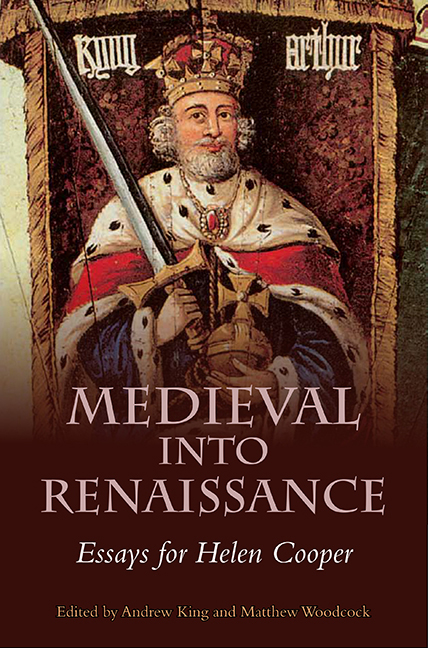Book contents
- Frontmatter
- Contents
- List of Illustrations
- List of Contributors
- Acknowledgments
- Abbreviations
- Introduction
- Unknowe, unkow, Vncovthe, uncouth: From Chaucer and Gower to Spenser and Milton
- Armour that doesn't work: An Anti-meme in Medieval and Renaissance Romance
- ‘Of his ffader spak he no thing’: Family Resemblance and Anxiety of Influence in Fifteenth-Century Prose Romance
- Writing Westwards: Medieval English Romances and their Early Modern Irish Audiences
- Penitential Romance after the Reformation
- The English Laureate in Time: John Skelton's Garland of Laurel
- Thomas Churchyard and the Medieval Complaint Tradition
- Placing Arcadia
- Fathers, Sons and Surrogates: Fatherly Advice in Hamlet
- ‘To visit the sick court’: Misogyny as Disease in Swetnam the Woman-Hater
- The Monument of Uncertainty: Sovereign and Literary Authority in Samuel Sheppard's The Faerie King
- Mopsa's Arcadia: Choice Flowers Gathered out of Sir Philip Sidney's Rare Garden into Eighteenth-Century Chapbooks
- Bibliography
- Index
- A Bibliography of Helen Cooper's Published Works
- Tabula Gratulatoria
Writing Westwards: Medieval English Romances and their Early Modern Irish Audiences
Published online by Cambridge University Press: 05 July 2016
- Frontmatter
- Contents
- List of Illustrations
- List of Contributors
- Acknowledgments
- Abbreviations
- Introduction
- Unknowe, unkow, Vncovthe, uncouth: From Chaucer and Gower to Spenser and Milton
- Armour that doesn't work: An Anti-meme in Medieval and Renaissance Romance
- ‘Of his ffader spak he no thing’: Family Resemblance and Anxiety of Influence in Fifteenth-Century Prose Romance
- Writing Westwards: Medieval English Romances and their Early Modern Irish Audiences
- Penitential Romance after the Reformation
- The English Laureate in Time: John Skelton's Garland of Laurel
- Thomas Churchyard and the Medieval Complaint Tradition
- Placing Arcadia
- Fathers, Sons and Surrogates: Fatherly Advice in Hamlet
- ‘To visit the sick court’: Misogyny as Disease in Swetnam the Woman-Hater
- The Monument of Uncertainty: Sovereign and Literary Authority in Samuel Sheppard's The Faerie King
- Mopsa's Arcadia: Choice Flowers Gathered out of Sir Philip Sidney's Rare Garden into Eighteenth-Century Chapbooks
- Bibliography
- Index
- A Bibliography of Helen Cooper's Published Works
- Tabula Gratulatoria
Summary
In the early 1630s, the Irish historian Geoffrey Keating addressed the question of the historicity or lack thereof of the pantheon of Gaelic heroes known as the Fian. In terms that recall similar debates over Arthur and his knights, he cites oral tradition, ancient documents and surviving monuments as evidence for the reality of these ancient heroes. However, he notes that, even if the individuals involved existed, not everything written about them should be taken as historically accurate:
Agus da n-abradh aoinneach nach inchreidthe moran dar scriobhadh ar an bh-Fein, is deimhin gurab fior do e, oir ni raibhe rioghacht san bhith is nach scriobhthaidhe re linn na Pagantachta sceoil da ngairthi fabulae. Feach Ridire na Gréine, Bevis of Hamton, Huon of Burdex, agus a samhail oile sin do scriobhadh le linn an Chreidimh fein.
(And should anyone say that much of what has been written about the Fian is not to be believed, he would certainly state the truth; for there was no kingdom in the world in which there were not written tales called fabulae in Pagan times, for example, the Knight of the Sun, Bevis of Hamton, Huon of Burde[u]x, and other such like, which were written even in the time of the Faith.)
Keating's literary allusions here have generally been passed over by scholars, but they merit some examination. Of the three texts cited, we only have firm evidence for the circulation of one, Sir Bevis of Hampton, in Ireland before this point. Yet Keating, writing in Irish for an Irish audience, holds these texts up as examples of narratives with which he clearly expects his readers to be familiar. In the case of ‘Huon of Burdex’, the form in which the title is given suggests Keating is thinking of the romance as an English text, rather than a French one, probably in the version translated by Lord Berners around 1515 and which went through numerous editions throughout the sixteenth century. Bevis of Hampton was translated into Irish from Middle English at the end of the fifteenth century, but once more the form that Keating gives for the title is so far removed from the form of the hero's name in that Irish translation – Bibus o Hamtuir – that it seems likely that he knew the romance in English.
- Type
- Chapter
- Information
- Medieval into RenaissanceEssays for Helen Cooper, pp. 73 - 90Publisher: Boydell & BrewerPrint publication year: 2016

